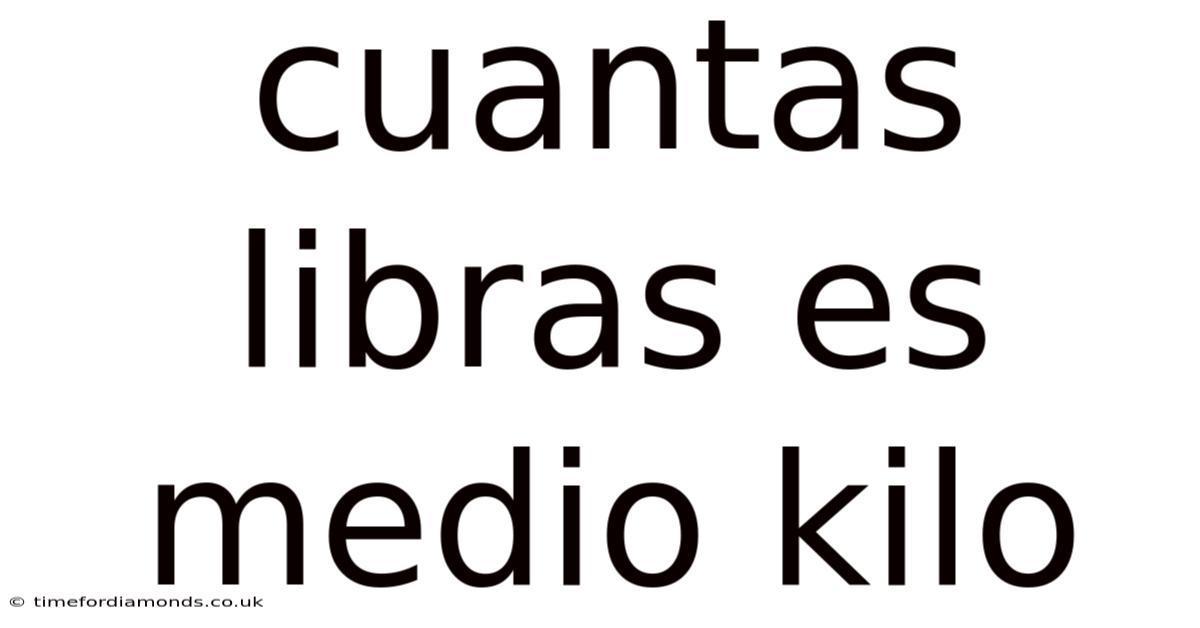Cuantas Libras Es Medio Kilo
timefordiamonds
Sep 15, 2025 · 4 min read

Table of Contents
How Many Pounds is Half a Kilo? A Comprehensive Guide to Metric and Imperial Conversions
Understanding unit conversions is a fundamental skill, especially when dealing with weights and measures. This comprehensive guide will delve into the question: how many pounds is half a kilo? We'll explore the conversion process, provide practical examples, and address frequently asked questions to ensure you have a thorough understanding of this common conversion. This guide is designed for everyone, from students learning about measurement systems to cooks needing to accurately adjust recipes.
Understanding the Metric and Imperial Systems
Before we tackle the conversion, let's quickly review the two systems involved: the metric system and the imperial system.
-
Metric System (International System of Units - SI): This system, based on powers of 10, is used globally and is characterized by its simplicity and consistency. The base unit for mass is the kilogram (kg). Other units like grams (g) and milligrams (mg) are derived from the kilogram.
-
Imperial System (US Customary System): Primarily used in the United States, this system is less systematic and involves less intuitive conversions. The base unit for weight is the pound (lb). Other units include ounces (oz) and tons.
The difference between weight and mass is important to note. Mass is the amount of matter in an object, while weight is the force of gravity acting on that mass. While often used interchangeably in everyday conversation, the distinction is crucial in scientific contexts. This article uses "weight" and "mass" interchangeably for simplicity, aligning with common usage in this context.
Converting Half a Kilo to Pounds: The Calculation
The core of our inquiry is the conversion of 0.5 kilograms (half a kilogram) to pounds. The conversion factor we need is:
1 kilogram (kg) ≈ 2.20462 pounds (lb)
To find out how many pounds are in 0.5 kg, we simply multiply 0.5 by the conversion factor:
0.5 kg * 2.20462 lb/kg ≈ 1.10231 lb
Therefore, half a kilogram is approximately 1.10 pounds. For most practical purposes, rounding to 1.1 pounds is sufficient.
Practical Applications and Examples
Understanding this conversion is valuable in numerous situations:
-
Cooking and Baking: Many recipes use metric units, especially those originating from countries using the metric system. Converting ingredients from kilograms to pounds is crucial for accurate measurements and successful results. For example, if a recipe calls for 0.5 kg of flour, you would need approximately 1.1 pounds of flour.
-
Shipping and Logistics: International shipping often involves weight specifications in both metric and imperial units. Knowing the conversion ensures accurate documentation and avoids potential issues with customs or shipping carriers.
-
Scientific Experiments and Research: In scientific research involving weight or mass measurements, accurate conversions are essential for data consistency and analysis.
-
Everyday Purchases: Even when purchasing everyday items, you might encounter weight labels using different systems. Being able to convert between them aids in comparisons and informed purchasing decisions.
Let's illustrate with a few more examples:
- 1 kg of apples ≈ 2.2 pounds of apples
- 2.5 kg of potatoes ≈ 5.5 pounds of potatoes
- 0.25 kg of sugar ≈ 0.55 pounds of sugar
Beyond the Basics: Exploring Other Conversions
While we've focused on half a kilogram, understanding the broader context of kilogram-to-pound conversions is beneficial. Here's a table summarizing common conversions:
| Kilograms (kg) | Pounds (lb) (Approximate) |
|---|---|
| 0.25 | 0.55 |
| 0.5 | 1.10 |
| 1 | 2.20 |
| 1.5 | 3.31 |
| 2 | 4.41 |
| 2.5 | 5.51 |
| 5 | 11.02 |
| 10 | 22.05 |
Frequently Asked Questions (FAQ)
Q: Is the conversion factor always exactly 2.20462?
A: No, the conversion factor is an approximation. The exact conversion factor is a slightly longer decimal, but 2.20462 is accurate enough for most practical purposes.
Q: Why are there two different systems of measurement?
A: The metric system is a more modern and internationally standardized system. The imperial system has historical roots and is still used primarily in the United States and a few other countries due to inertia and cost of conversion.
Q: Are there online converters for this?
A: Yes, numerous online converters are readily available to assist with kilogram-to-pound conversions and many other unit conversions. These tools can be very helpful for quick calculations.
Q: What about converting ounces to grams?
A: The conversion factor for ounces to grams is approximately 28.35 grams per ounce. This is another important conversion often required in cooking and other applications.
Conclusion: Mastering Unit Conversions
Mastering unit conversions, such as converting kilograms to pounds, is an essential skill with practical applications in various aspects of life. Understanding the process, the conversion factor, and its applications will enhance your ability to handle measurements accurately and efficiently, whether you're cooking, shipping goods, or conducting scientific experiments. Remembering the approximate conversion of 1 kg to 2.2 pounds provides a quick and easy method for most everyday conversions, making this seemingly complex process straightforward and manageable. By understanding the underlying principles and practicing conversions, you'll confidently navigate the world of weights and measures with ease.
Latest Posts
Latest Posts
-
Kak Perevesti Kilogrammy V Funty
Sep 15, 2025
-
7 Foot 6 To Cm
Sep 15, 2025
-
30 Sq Meters To Feet
Sep 15, 2025
-
Cuantos Mililitros Son 4 Onzas
Sep 15, 2025
-
Cuantas Pies Es Una Yarda
Sep 15, 2025
Related Post
Thank you for visiting our website which covers about Cuantas Libras Es Medio Kilo . We hope the information provided has been useful to you. Feel free to contact us if you have any questions or need further assistance. See you next time and don't miss to bookmark.